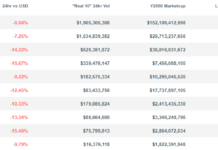[ad_1]
South Korea’s top cryptocurrency exchanges, even as competitors, have launched a joint initiative to strengthen their anti-money laundering efforts.
According to a joint press release, Bithumb, Upbit, Corbit, and Coinone announced that they have established a joint anti-money laundering initiative. The plan includes a hotline between the four entities that share real-time information on suspected/proven trading activities. They include cases related to unregistered security offerings, exploitative lending, and voice phishing.
The exchanges will also set up a shared database of suspicious crypto wallet addresses. It would assist the companies to detect the distribution of larger-quantity amounts from multiple trading platforms to a single wallet. A shared database, according to the companies, will prevent such activities.
An excerpt from the press release read:
“The joint AML initiative is expected to produce significant results as all four exchanges currently employ effectual user protection and fraud detection practices,”
“In addition, the exchanges have experience operating bank-authenticated virtual accounts, resulting in strong relationships with traditional financial institutions,” the exchanges added.
Crypto Exchanges under Banking Laws
The move follows two years of South Korea’s love-hate affair with cryptocurrencies. In 2017, the Financial Service Commission (FSC) saw plenty of financial misconducts amidst the then-ongoing crypto boom. In response, the securities regulator proposed to ban initial coin offerings. It stated that cryptocurrencies were neither means of exchange nor financial products. However, the National Assembly did not enforce the proposal into a law.
At the same time, the South Korean crypto industry saw a rise in cases related to digital currency Ponzi schemes, market manipulation, wash trading, arbitrage trading, and the hacking of top exchanges.
The misconducts prompted the lawmakers and enforcers to take a steer of administrative actions. It led to arrests – one including the chief of crypto exchange Coinnes who embezzled tens of millions of dollars from traders’ accounts. In January 2018, FSC vice chairman Kim Yongbeom announced a ban on anonymous trading on local crypto exchanges. He also restricted foreigners and minors from trading cryptocurrencies.
Crypto trading in South Korea figures among the busiest markets by volume in the world. | Source: Shutterstock.
In April 2018, fourteen South Korean crypto exchanges, including Bithumb, OKCoin, and Upbit, issued a set of self-regulatory guidelines. One of the major highlights of these guidelines was the willingness of participants to monitor and report suspicious transactions.
In June 2018, the newly-formed Korea Financial Intelligence Unit (FIU) announced that it would oversee crypto exchanges under the banking act.
“We plan to include virtual currency exchanges under [the] direct supervision of the AML/CFT (Anti-Money Laundering/ Countering Terrorism Financing) system,” the FIU said. “If a virtual currency exchange does not comply with these obligations, the FIU or the entrusted FSS [Financial Supervisory Service] will be able to inspect the monitoring system of the virtual currency exchange.”
Pending Crypto Bills in National Assembly
Despite the efforts made by regulators and cryptocurrency exchanges alike, the South Korean crypto industry is still waiting for clear guidance from the National Assembly.
The FSC confirmed that they had submitted a crypto bill in July 2018 before the assembly. It proposed to amend the Electronic Financial Transactions Act with new definitions for cryptocurrencies and its related businesses. However, the proposal is still pending before the assembly, alongside five separate bills.
The South Korean parliament expects to enforce the bills in 2019.
CCN has reached BitHumb and Upbit for comment. We will update the article with their statements.
[ad_2]
Source link




